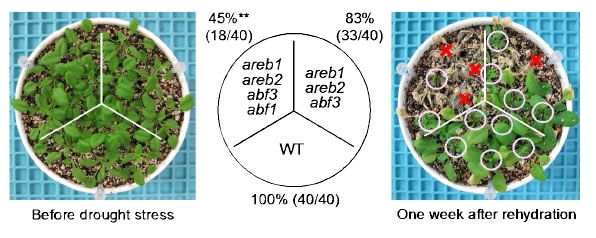Four AREB/ABF transcription factors function downstream of three SnRK2 protein kinases to regulate drought stress tolerance
Description
Global climate change has increased the frequency and severity of drought, resulting in significant yield losses in staple crops worldwide. Drought is one of the major abiotic stresses that adversely affect plant growth, survival, distribution, and productivity. Under drought conditions, many genes involved in drought stress response are induced in a wide range of plant species. The plant hormone abscisic acid (ABA) plays a crucial role in coordinating the responses to reduced water availability as well as in multiple developmental processes. Endogenous ABA levels in plant cells are increased in response to drought stress, leading to expression of stress-responsive genes. In a model plant Arabidopsis, under drought stress conditions, ABA controls stress-responsive gene expression mainly through three bZIP transcription factors (TFs) -- AREB1/ABF2, AREB2/ABF4 and ABF3 -- which are activated by SNF1-related kinase 2s (SnRK2s) such as SRK2D/SnRK2.2, SRK2E/SnRK2.6/OST1, and SRK2I/SnRK2.3 (SRK2D/E/I). However, as the three AREB/ABFs are required, but not exclusive, for the SnRK2-mediated gene expression, transcriptional pathways regulated by SRK2D/E/I remain unknown.
In this report, we show that a Clade A bZIP transcription factor, ABF1, function as a homolog of AREB1/ABF2, AREB2/ABF4, and ABF3 in ABA-dependent gene expression in Arabidopsis. In spite of lower expression levels of ABF1 than those of the three AREB/ABFs, the areb1 areb2 abf3 abf1 quadruple knockout mutant plants exhibited enhanced sensitivity to drought and reduced sensitivity to ABA in primary root growth compared with the areb1 areb2 abf3 triple knockout mutant. Large-scale transcriptome analyses uncovered that expression of downstream genes of SRK2D/E/I, which include many functional genes in drought stress responses and tolerance such as TFs and LEA proteins, was mostly impaired in the quadruple mutant. These results indicate that the four AREB/ABFs are the predominant TFs downstream of SRK2D/E/I in ABA signaling in response to drought stress during vegetative growth.
Considering that many findings strengthen the view that ABA signaling has contributed to land colonization and adaptation to various environmental changes, the manipulation of genes involved in ABA signaling has the potential to improve crop productivity and quality under drought stress conditions. AREB/ABFs, which are key players in drought stress response, are well conserved in land plants, so that the four AREB/ABFs can be good candidates to engineer enhanced drought tolerance. Thus, engineering ABA signaling through manipulation of SnRK2-AREB/ABF-mediated transcriptional regulation would create a new path to face climate change through improvement of crop production.
Figure, table
-
Fig. 1. The areb1 areb2 abf3 abf1 quadruple knockout mutant displays enhanced sensitivity to drought compared with the areb1 areb2 abf3 triple knockout mutant. Watering was withheld from 4-week-old plants for 11–12 d, and then the plants were re-watered for 1 week before the photograph was taken. Circles and crosses indicate survival and dead plants, respectively. Wild-type (WT) and two kinds of mutant plants (n = 5 each) were grown in soil in a 9 cm pot. Survival rates were shown in the central column and calculated from the results from eight independent experiments (n=40). Representative result is shown. **P < 0.01(Student’s t-test, based on comparison with WT)
-
Fig. 2. Model showing the AREB/ABF-SnRK2 pathway that controls ABA-mediated transcriptional regulation in responses to drought stress in plants
- Affiliation
-
Japan International Research Center for Agricultural Sciences Biological Resources and Post-harvest Division
- Classification
-
Administration A
- Research project
- Program name
- Term of research
-
FY 2014 (FY 2007-FY 2014)
- Responsible researcher
-
Yoshida Takuya ( University of Tokyo )
Fujita Yasunari ( Biological Resources and Post-harvest Division )
Maruyama Kyounoshin ( Biological Resources and Post-harvest Division )
Mogami Junro ( University of Tokyo )
Todaka Daisuke ( University of Tokyo )
KAKEN Researcher No.: 10533995Shinozaki Kazuko ( University of Tokyo )
ORCID ID0000-0002-0249-8258Shinozaki Kazuo ( RIKEN )
KAKEN Researcher No.: 20124216 - ほか
- Publication, etc.
-
https://doi.org/10.1111/pce.12351
Yoshida et al. (2015) Plant Cell Environ. 38:35-49.
- Japanese PDF
-
2014_B04_A3_ja.pdf250.99 KB
2014_B04_A4_ja.pdf284.16 KB
- English PDF
-
2014_B04_A3_en.pdf210.33 KB
2014_B04_A4_en.pdf260.85 KB
- Poster PDF
-
2014_B04_poster.pdf402.53 KB


